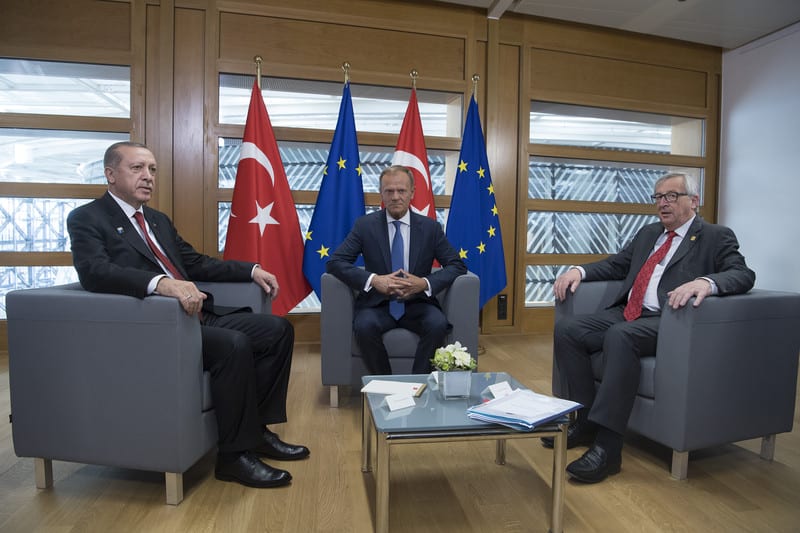By Bugra Susler, EUObserver
The Turkey-US trade spat has led to EU leaders backing Turkey against the US administration’s policies.
This not only shows the extent of economic interdependence between Europe and Turkey, but also signals the development of a common stance in the face of a bullying trade partner.
When US president Donald Trump took to Twitter to celebrate the downward trajectory of the Turkish lira against the US dollar, Europe was concerned about the potential spillover of rapidly growing economic turmoil in Turkey.
In particular, Germany, Turkey’s biggest trading partner, came to Turkey’s defence.
At a news conference in Berlin, German chancellor Angela Merkel made it clear that “Germany would like to see an economically prosperous Turkey” and emphasised that “No one has an interest in the economic destabilisation of Turkey.”
Shortly afterwards, there was a national debate in Germany on whether to provide financial assistance to Turkey to mitigate the effects of the crisis on German businesses.
In Italy, decision makers were equally concerned about contagion from Turkish markets as the shares of European banks with the highest exposure to Turkey fell at an alarming rate.
Meanwhile, the European Parliament declared the tariffs as illegitimate and urged the US to solve its problems with Turkey with “constructive diplomatic engagement”.
French economy minister Bruno Le Maire vowed to “strengthen economic ties between France and Turkey” signalling that France and Turkey would work together to take a stance against the US.
Transatlantic polarisation
We are witnessing increasing polarisation in the transatlantic alliance. In the past 12 months alone, the tension between Europe and the US escalated like never before.
No US president had ever called the EU a “foe” or openly threatened to inflict economic pain.
From the Middle East peace process to the Iran nuclear deal, the US and Europe have found themselves on the opposing sides of global conflicts and major foreign policy issues.
It is clear that the EU does not intend to bow to pressure easily; for example, it has reaffirmed its commitment to the Iran nuclear deal and threatened to sanction European firms doing business with Iran if they ever abide by US sanctions.
With European interests at stake, the row between Turkey and the US can even be considered as another episode in the global standoff between Europe and the US.
What is particularly important is that this came at a time when the EU needs Turkey the most to curb irregular migration into Europe, which is top of the European agenda.
In recent years, cooperation with Turkey has proved very effective in reducing the number of illegal crossings into the EU and, for this reason, EU leaders have agreed to provide further funding to Turkey.
Drawing on the success of cooperation with Turkey at a recent EU summit, they have also agreed to work closely with other third countries bordering the EU with the aim of establishing “regional disembarkation platforms” for processing asylum applications outside the EU.
Certainly, chaos in Turkey is undesirable also because irregular migration has become a pressing issue for national governments across the EU and due to Turkey’s role in ensuring European security.
European leaders speak up not only because of the implications of a potential spillover but also because they feel the need to react to the Trump administration’s hostile attitude towards allies.
In June, the EU introduced retaliatory tariffs on US goods and opened a World Trade Organisation case to challenge what it called Trump’s “illegal” and “purely protectionist” decision to impose trade tariffs on steel and aluminium.
There is a growing sense in Europe that collective action is needed for dealing with the US administration.
Indeed, a rupture in the transatlantic community is not good news for the future of Nato and could hurt Western military cooperation against potential aggressors.
Statements by EU leaders saying Europe can no longer rely on the US for protection show the gravity of the situation.
New Turkey-EU momentum
The silver lining here, perhaps, is that the spat between Turkey and the US can bring a new momentum to Turkey-EU relations, which have significantly deteriorated in recent years.
Of course, this is not to say that they can go back to their “honeymoon” period in the early 2000s and, indeed, there are numerous outstanding issues to be resolved.
However, the realisation of the political and economic interconnectedness of Turkey and the EU has reinforced the notion that they are in the same boat and faced with common challenges.
Ultimately, the Trump administration’s take on American exceptionalism may lead to a reconfiguration of alliances in the years to come.
A foreign policy based on “America first” is likely to result in further isolation for the US to the extent that it undermines the US’ major allies across the world.
Bugra Susler is visiting fellow at the Centre for International Studies at the London School of Economics (LSE).









